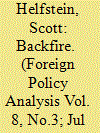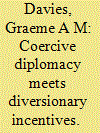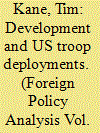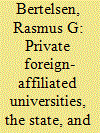|
|
|
Sort Order |
|
|
|
Items / Page
|
|
|
|
|
|
|
| Srl | Item |
| 1 |
ID:
114132


|
|
|
|
|
| Publication |
2012.
|
| Summary/Abstract |
States attempting surprise attacks usually achieve tactical success in catching an opponent unprepared. Many studies of surprise do not look beyond the opening bolt from the blue to examine the impact of surprise based on the broader strategic objectives. A comparative case study of centrally planned surprise attacks from 1950 to 1990 suggests that surprise rarely achieves strategic ends. They did not deter the targets from military action, and more surprisingly, did not contribute to less deadly wars. This runs counter to conventional beliefs about surprise, since attacks are supposed to impair a target's desire or ability to mount a military response. Instead, the most damaging surprises are followed by particularly bloody conflict, a phenomenon referred to here as backfire. The article examines a number of possible strategic explanations for this empirical pattern and ultimately concludes that behavioral decision-making processes characterized by prospect theory offer the best possible explanation. An increased propensity for risk, resulting from the losses suffered during a large surprise, drives target military reaction despite the lower likelihood of success.
|
|
|
|
|
|
|
|
|
|
|
|
|
|
|
|
| 2 |
ID:
114134


|
|
|
|
|
| Publication |
2012.
|
| Summary/Abstract |
This paper applies theories of strategic conflict avoidance and diversionary war to help explain US-Iranian interactions. The article argues that US attempts at coercive diplomacy have tended to strengthen hardliners in Iran by allowing them to frame opposition to government policies as support for the United States. In particular, US public uncertainty about the advisability of using force against Iran provided both the Supreme Leader and the Iranian President with an opportunity to increase tensions with the United States with little concern about provoking a military strike. The aggressive stance of the Iranian regime is about developing a threat which diverts attention from domestic problems and places it firmly in the arena of the international.
|
|
|
|
|
|
|
|
|
|
|
|
|
|
|
|
| 3 |
ID:
114131


|
|
|
|
|
| Publication |
2012.
|
| Summary/Abstract |
For over six decades, the US military has shaped international economic development, notably by way of nearly 31 million US troop-year deployments since 1950. Worldwide, life expectancy increased by 10 years between 1970 and the present. The mortality rate of children dropped from 132 per 1,000 live births to 55. The number of telephone lines per capita quadrupled from 48 to 196 per thousand. In each case, the improvement was faster in countries with a heavy US troop presence and slower in countries with zero US troop presence. These relationships stem from a data set on US deployments across all countries and years from 1950 to the present matched with World Bank data on indicators of social well-being since 1970 across 148 countries. The positive relationship between American forces and social development holds in econometric regressions even when controlling for initial income levels and initial social indicator levels.
|
|
|
|
|
|
|
|
|
|
|
|
|
|
|
|
| 4 |
ID:
114133


|
|
|
|
|
| Publication |
2012.
|
| Summary/Abstract |
This article contributes to the understanding of the soft power of private foreign-affiliated universities and the interaction between such universities and the state for university soft power and national soft power. The analysis shows university soft power in their Middle East host societies and its basis of academic excellence and biculturalism. Historically, university soft power has been limited first by proselytizing and later by unpopular American foreign policy. The universities have previously undescribed reverse university soft power in the USA on behalf of the Middle East: advocating Middle East interests and raising moral, political, and financial support for education, healthcare, and development in the region. The USA has pursued national soft power through the American University of Beirut and the American University in Cairo since the 1950s. University soft power has been furthered by US government financial assistance to academic excellence, while too close association with the US government has threatened university soft power. The universities have contributed to the national soft power of the USA concerning milieu goals of attraction to education, language, and liberal norms among elites. The universities have not contributed to national soft power regarding the acceptance of unpopular US foreign policies in the Middle East, which was also not a university or US government goal.
|
|
|
|
|
|
|
|
|
|
|
|
|
|
|
|
| 5 |
ID:
114129


|
|
|
|
|
| Publication |
2012.
|
| Summary/Abstract |
Religious beliefs can affect preferences of decision makers who formulate and guide foreign policy. This article investigates the relationship between preferences affected by Islamic worldview of Turkey's new leadership and foreign policy the new elite conduct through two simple models. The models are games against nature; thus, Turkey is the only decision maker facing no strategic uncertainty. It is found that the subjective estimates of achieving gains under the new foreign policy (NWP) and the old foreign policy (SQP) are critical and distinct from gains and costs of both policies. The new Turkish foreign policy (NWP) is a reversible move, even though Turkish decision makers evaluate it as generating a higher gain and a lower cost compared with the preservation of the status quo (SQP). The implementation of the NWP does not only depend on its gain but also on how attractive is the SQP.
|
|
|
|
|
|
|
|
|
|
|
|
|
|
|
|
| 6 |
ID:
114130


|
|
|
|
|
| Publication |
2012.
|
| Summary/Abstract |
This paper explores an issue that is both domestic and international: whether legalization of prostitution leads to an increase in human trafficking. For both theory and public policy, this is an important query to answer, with implications beyond the cases in question. The principal domains of investigation are Germany, Sweden, and the Netherlands. These states subscribe to UN, EU, Council of Europe and OSCE agreements and are located in the same geographic region, yet have adopted opposite approaches to prostitution. The Netherlands and Germany legalized prostitution in 2000 and 2002, respectively. Sweden outlawed it in 1999 and imposed criminal penalties for the purchase of illicit sex. The preceding characteristics make these states ideal for a comparative exercise in the context of competing perspectives on human trafficking and legalized prostitution. We find that legalization leads to an increase in trafficking. The dynamics of trafficking are also associated with numerous factors, among which the most critical are government efforts specifically targeting the activity in the field of law enforcement. Implications for theory and public policy are offered, along with ideas about future research.
|
|
|
|
|
|
|
|
|
|
|
|
|
|
|
|
|
|
|
|
|